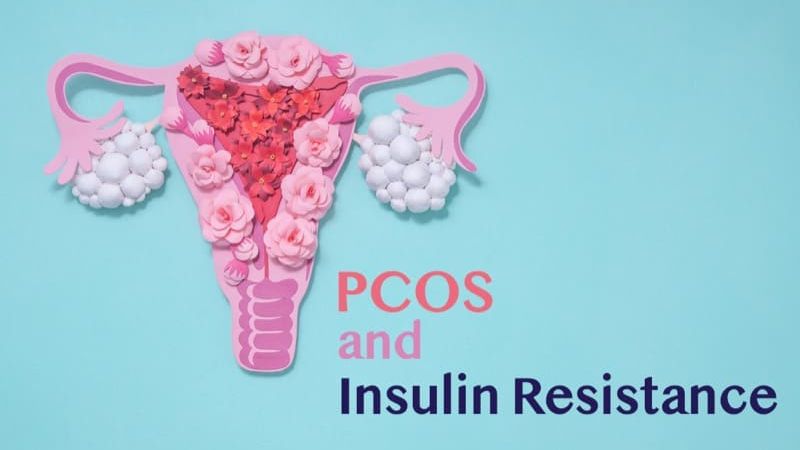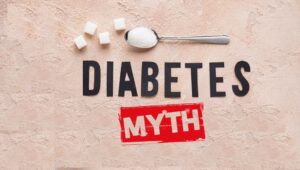PCOS and Insulin Resistance: The Hidden Connection

PCOS and Insulin Resistance: The Hidden Connection
Polycystic Ovary Syndrome (PCOS) is one of the most common hormonal disorders affecting women of reproductive age. A critical factor in PCOS is insulin resistance, which affects up to 70% of women with PCOS, regardless of body weight. Understanding this connection is essential because insulin resistance not only worsens PCOS symptoms but also increases the risk of long-term metabolic complications.
What Is Insulin Resistance?
Insulin is a hormone produced by the pancreas that allows cells to use glucose (sugar) from food for energy. In insulin resistance, the body’s cells do not respond properly to insulin. This leads to:
- Glucose buildup in the bloodstream
- Increased insulin production (hyperinsulinemia)
High insulin levels can disrupt hormone balance, directly affecting ovarian function and worsening PCOS symptoms.
How Insulin Resistance Affects PCOS
High insulin levels in women with PCOS can trigger a range of changes:
| Effect of High Insulin | Impact on PCOS |
|---|---|
| Increases androgen (testosterone) production | Leads to acne, excessive hair growth (hirsutism), irregular periods |
| Disrupts ovulation | Causes missed periods or infertility |
| Promotes fat storage (especially abdominal) | Contributes to weight gain and inflammation |
| Impacts ovarian follicles | Prevents proper follicle maturation, forming cysts |
Key Point: Insulin resistance can both cause and result from PCOS, creating a vicious cycle that perpetuates symptoms and metabolic risks.
Why Insulin Resistance in PCOS Is Important
Insulin resistance in PCOS goes beyond irregular periods or weight concerns. When the body struggles to use insulin effectively, it can trigger a cascade of long-term health risks, including:
- Type 2 Diabetes: Persistently high insulin and blood sugar levels can eventually lead to diabetes.
- Cardiovascular Issues: Insulin resistance increases the risk of high blood pressure, high cholesterol, and heart disease.
- Metabolic Syndrome: A cluster of conditions, including abdominal fat, high blood sugar, and abnormal cholesterol levels, that raise the risk of chronic illness.
Effectively managing insulin resistance is therefore critical not only for controlling PCOS symptoms, such as irregular periods, acne, and excess hair, but also for preserving fertility and protecting long-term metabolic health. Early intervention through lifestyle adjustments, diet, exercise, and medical support can break this cycle and improve overall outcomes.
Strategies to Improve Insulin Sensitivity in PCOS
Addressing insulin resistance is a central part of managing PCOS. By improving how the body responds to insulin, women can better control their symptoms, regulate hormone levels, and reduce long-term health risks. Here are the most effective strategies:
1. Optimize Nutrition
A well-structured diet can have a significant impact on insulin sensitivity. Focus on foods that provide steady energy and minimize blood sugar spikes:
- Include whole grains, vegetables, and lean proteins as the foundation of meals.
- Limit added sugars and refined carbohydrates, which can worsen insulin resistance.
- Incorporate fiber-rich and anti-inflammatory foods, such as berries, leafy greens, nuts, and seeds, to support metabolic health.
Practical Tip: Planning meals in advance and controlling portion sizes can make dietary changes easier to maintain long-term. Encourage variety to make healthy eating enjoyable and sustainable.
2. Engage in Regular Physical Activity
Exercise is one of the most effective tools for improving insulin sensitivity. Aim for at least 150 minutes of moderate activity per week, which can include:
- Brisk walking, cycling, swimming, or dancing
- Resistance training with weights or bodyweight exercises
Exercise not only improves insulin response but also helps with weight management, hormone balance, and stress reduction. For best results, combine aerobic activity with strength training throughout the week.
3. Maintain a Healthy Weight
Even modest weight loss (5–10% of body weight) can significantly improve insulin sensitivity, restore ovulation, and reduce androgen levels. Focus on gradual and sustainable approaches:
- Combine balanced nutrition with consistent exercise.
- Avoid crash diets or extreme restrictions, which can be counterproductive.
Tip: Track progress with realistic goals and celebrate small achievements to maintain motivation.
4. Use Medications and Supplements When Needed
In some cases, lifestyle changes alone may not be sufficient. Certain medications and supplements can help:
- Metformin: Improves insulin sensitivity, helps regulate menstrual cycles, and supports weight management.
- Inositol (myo-inositol + D-chiro-inositol): A natural supplement shown to improve insulin function and hormonal balance.
Important: Medications work best when combined with lifestyle adjustments such as diet, exercise, and stress management.
5. Prioritize Sleep and Manage Stress
Poor sleep and chronic stress increase cortisol, which can worsen insulin resistance. Small adjustments can make a big difference:
- Maintain a consistent sleep schedule, aiming for 7–9 hours per night.
- Practice relaxation techniques, such as meditation, deep breathing, or gentle yoga.
- Reduce screen time before bed to improve sleep quality.
Insight: Addressing both stress and sleep alongside diet and exercise significantly enhances insulin sensitivity, helping to break the cycle of PCOS-related hormone imbalances.
Long-Term Benefits of Targeting Insulin Resistance in PCOS
Effectively managing insulin resistance in women with PCOS offers far-reaching benefits for both reproductive health and overall well-being. Some of the key advantages include:
- Regulated Menstrual Cycles: By improving insulin sensitivity, hormonal balance is restored, helping to normalize periods and reduce irregularities.
- Enhanced Fertility: Restoring insulin function supports ovulation, increasing the likelihood of conception and improving reproductive outcomes.
- Reduction in Androgen-Related Symptoms: Lower insulin levels help decrease excess androgen production, which can lead to less acne, reduced facial and body hair growth, and improved skin health.
- Improved Metabolic Health: Managing insulin resistance lowers the risk of Type 2 diabetes, heart disease, and metabolic syndrome, promoting long-term cardiovascular and metabolic well-being.
Key Insight: Addressing insulin resistance is not only central to managing PCOS symptoms but also a critical step in protecting long-term health and enhancing quality of life.
Final Words
Insulin resistance is at the heart of PCOS, influencing hormone levels, ovulation, and long-term metabolic health. By addressing insulin resistance through balanced nutrition, regular exercise, weight management, and, when necessary, medical treatment, women can regain hormonal balance, improve fertility, and reduce the risk of complications such as type 2 diabetes and heart disease.
Written by:
Dr. Michael Harris, MD – Board-certified endocrinologist specializing in hormonal and metabolic disorders in women, with extensive experience in managing PCOS and insulin resistance.
Reviewed by:
Linda Carter, RN, CDE – Registered Nurse and Certified Diabetes Educator with expertise in patient education, diabetes management, and lifestyle interventions for women’s health.
References
- American Diabetes Association. Insulin Resistance and Hyperinsulinemia in Type 2 Diabetes. Diabetes Care. https://diabetesjournals.org/care/article/31/Supplement_2/S262/24841/Insulin-Resistance-and-HyperinsulinemiaIs
- Gurevich, R. High Androgens in Females: Symptoms, Causes, and Treatments. Verywell Health. https://www.verywellhealth.com/androgens-and-pcos-excess-levels-what-it-means-4156771
- Cassar, S., et al. Insulin resistance in polycystic ovary syndrome: a systematic review and meta-analysis. Human Reproduction. https://academic.oup.com/humrep/article/31/11/2619/2274340
- National Heart, Lung, and Blood Institute (NHLBI).Metabolic Syndrome. National Institutes of Health. https://www.nhlbi.nih.gov/health/metabolic-syndrome






1 thought on “PCOS and Insulin Resistance: The Hidden Connection”